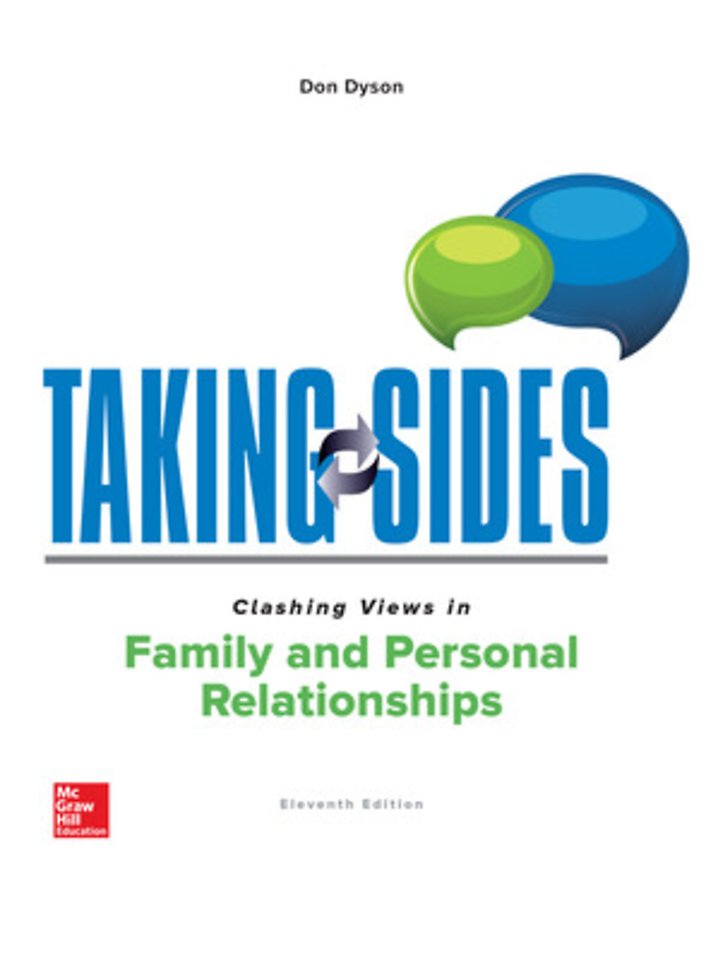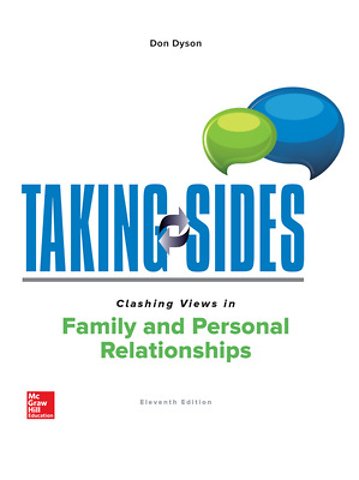Taking Sides: Clashing Views in Family and Personal Relationships
Samenvatting
The Taking Sides Collection on McGraw-Hill Create® includes current controversial issues in a debate-style forma designed to stimulate student interest and develop critical thinking skills. This Collection contains a multitude of current and classic issues to enhance and customize your course. You can browse the entire Taking Sides Collection on Create or you can search by topic, author, or keywords. Each Taking Sides issue is thoughtfully framed with Learning Outcomes, an Issue Summary, an Introduction, and an "Exploring the Issue" section featuring Critical Thinking and Reflection, Is There Common Ground?, Additional Resources, and Internet References. Go to the Taking Sides Collection on McGraw-Hill Create® at www.mcgrawhillcreate.com/takingsides and click on "Explore this Collection" to browse the entire Collection. Select individual Taking Sides issues to enhance your course, or access and select the entire Dyson: Taking Sides: Clashing Views in Family and Personal Relationships, 11/e book here http://create.mheducation.com/createonline/index.html#qlink=search%2Ftext%3Disbn:1260181545 for an easy, pre-built teaching resource. Visit http://create.mheducation.com for more information on other McGraw-Hill titles and special collections.
Specificaties
Inhoudsopgave
<br/><u>Issue: Is Internet Pornography Harmful to Teenagers?</u><br/>YES: Wayne Grinwis, from “Is Pornography Harmful to Teenagers? Yes!” Original essay written for this volume (2009)<br/>NO: Justin A. Sitron, from “Why Porn Is Not Harmful to Teens,” Original essay written for this volume (2009)<br/><br><br/>Wayne Grinwis has been a Sexual Health Educator for Planned Parenthood for 15 years. He is also Adjunct Professor in the Department of Health at West Chester University. Grinwis credits Andrea Daniels for help with this article. Grinwis argues that pornography is all right for adults, but for teenagers, it can create unrealistic expectations about sex, provide a negative and inaccurate sexuality education, and increase sexual violence against women. Justin Sitron is an Assistant Professor of Education at Widener University. Sitron argues that pornography has no negative impact on teenagers and, in fact, has potential benefits. Sitron contends that Internet pornography can be helpful in providing teens an opportunity to see real bodies, a chance to learn about sex from seeing rather than doing, and an open door for communication with parents.<br/><br><br/><u>Issue: Should There Be Harsh Penalties for Teens Sexting?</u><br/>YES: Lisa E. Soronen, Nicole Vitale, and Karen A. Haase, from “Sexting at School: Lessons Learned the Hard Way,” National School Boards Association, Inquiry & Analysis (2010)<br/>NO: Julie Hilden, from “How Should Teens’ ‘Sexting’—The Sending of Revealing Photos—Be Regulated?” Findlaw.com (2009)<br/><br><br/>Lisa E. Soronen, Nicole Vitale, and Karen A. Haase are writing on legal issues for the National School Boards Association. This article encourages administrators to hand over cell phone sexting cases to the appropriate law enforcement agencies. Julie Hilden is a graduate of Harvard College and Yale Law School. A former clerk for Supreme Court Justice Stephen Breyer, she has more recently appeared on Good Morning America, Court TV, CNN, and NPR. Hilden argues that harsh penalties are extreme and unjust.<br/><br><br/><u>Issue: Is Traditional Masculinity Harmful to Boys and Men?</u><br/>YES: Brianna Attard, from “Toxic Masculinity: How Our Current System of Gender is Harmful to People,” The Sydney Feminists (2017)<br/>NO: Paul Nathanson, from “A Requiem for Manhood,” Australian Institute of Male Health and Studies (2018)<br/><br><br/>Brianna Attard is a researcher and writer at The Sydney Feminists, Inc. She wrote her first article for TSF on toxic masculinity. Brianna enjoys volunteering and working for organizations that operate within a feminist framework. She outlines Toxic Masculinity and its impact on women, men, and interpersonal interactions. Paul Nathanson has a BA (art history), a BTh (Christian theology), an MLS (library service), an MA (religious studies), and a PhD (religious studies). Of particular interest to him is the surprisingly blurry relation between religion and secularity: how religion underlies seemingly secular phenomena such as popular movies and political ideologies. Nathanson argues, through the use of cinematic examples, that there is a need among men for creating identity through masculinity.<br/><br><br/><u>Issue: Should Parents Allow Puberty Blocking Hormones for Their Transgender Children?</u><br/>YES: Jacqueline Ruttimann, from “Blocking Puberty In Transgender Youth,” Endocrine News (2013)<br/>NO: Michelle Cretella, from “I’m a Pediatrician: Here’s What I Did When a Little Boy Patient Said He Was a Girl,” The Daily Signal (2017)<br/><br><br/>Jacqueline Ruttimann is a freelance writer living in Chevy Chase, Maryland. She argues that pubertal blockers allow transgender youth to carefully consider transition and decreases the need for cross-sex hormones later in life, which results in fewer health risks for the individual. Michelle Cretella, MD, is the president of the American College of Pediatricians, a national organization of pediatricians and other health-care professionals dedicated to the health and well-being of children. She argues that no one is born transgender, and that “gender confused” children should be supported in their biological sex through puberty.<br/><br><br/>UNIT 4: Families and Systems<br/><br><br/><u>Issue: Should Illegal Immigrant Families Be Able to Send Their Children to Public Schools?</u><br/>YES: William Brennan, from Majority Opinion, Plyler v. Doe, U.S. Supreme Court (1982)<br/>NO: Warren Burger, from Dissenting Opinion, Plyler v. Doe, U.S. Supreme Court (1982)<br/><br><br/>William Brennan is regarded as one of the greatest intellectual leaders of the twentieth-century -Supreme Court. He was regarded for writing extraordinarily forward-thinking opinions, especially regarding civil rights and civil liberties. This case proves no exception, as he captures an issue that seems even more pertinent today than when the Supreme Court addressed it. Brennan believes that children who are in the country and undocumented have a constitutional right to a public education. Warren Burger was the Chief Justice of the Supreme Court during a time in which it was slowly moving in a more conservative direction. He was an instrumental voice in many cases before the Supreme Court that had a more conservative outcome. Burger believes that undocumented immigrant children have no constitutional right to an education.<br/><br><br/><u>Issue: Should Teachers in Schools Have Firearms?</u><br/>YES: Michael W. Goldberg, from “I’m a School Psychologist — And I Think Teachers Should Be Armed,” Forward (2018)<br/>NO: Eugene Scott, from “A Big Question in the Debate About Arming Teachers: What About Racial Bias?” Washington Post (2018)<br/><br><br/>Michael W. Goldberg is a School Psychologist. He earned his Masters in Psychology at SUNY New Paltz, and was born in Brooklyn in 1963, where he was raised by his Orthodox Jewish grandparents. He argues that arming specially trained teachers will decrease the likelihood of school shootings as well as decrease subsequent trauma for students. Eugene Scott writes about identity politics for The Fix. He was previously a breaking news reporter at CNN Politics. Scott argues that in schools, where racial bias among teachers has been well documented, arming teachers will likely result in the unwarranted deaths of students of color.<br/><br><br/><u>Issue: Should Cyber-Bullies Be Prosecuted?</u><br/>YES: Brianna Flavin, from “Is Cyberbullying Illegal? When Comments Turn Criminal,” Rasmussen College Blog (2017)<br/>NO: J. Graffeo, from “People v Marquan M.” New York State Law Reporting Bureau (2014)<br/><br><br/>Brianna Flavin is a freelance writer, content marketer, adjunct professor, and poet. She argues that cyberbullying is culturally pervasive and should be criminalized to prevent tragedies such as teen suicide and school shootings. The opposing view is presented by the verdict of the New York Court of Appeals in a case that argued that the cyberbullying law enacted was considered a violation of the defendant’s First Amendment free speech.<br/><br><br/><u>Issue: Should Parents of School Shooters Be Held Responsible for Their Children’s Actions?</u><br/>YES: Alia E. Dastagir, from “After a School Shooting, are Parents to Blame?” USA Today (2018)<br/>NO: John Cassidy, from “America’s Failure To Protect Its Children From School Shootings Is A National Disgrace,” The New Yorker (2018)<br/><br><br/>Alia E. Dastagir is a reporter covering cultural issues, including gender, race, and sexuality. She argues studies consistently show that teen violence is mitigated by consistent, nurturing adult influence and that those adults need to take their responsibility seriously. John Cassidy has been a staff writer at The New Yorker since 1995. In 2012, he began writing a daily column about politics and economics on newyorker.com. Cassidy argues that the federal government, in its unwillingness to stand up to gun lobbyists, is responsible for the ongoing epidemic of school shootings.<br/><br><br/><u>Issue: Is the Criminal Justice System Unfair to Black Families?</u><br/>YES: Samantha Daley, from “The Criminal Justice System Is Failing Black Families,” Rewire.News (2014)<br/>NO: Kay S. Hymowitz, from “Did Mass Incarceration Destroy the Black Family? No, and Here’s Why,” City Journal (2015)<br/><br><br/>Samantha Daley is a reproductive justice activist and a supervisor at a homeless shelter for youth and a writer in Echoing Ida, a project of Forward Together. She argues that the criminal justice system’s biased treatment toward black families creates a system that passes down racial disadvantage from generation to generation. Kay S. Hymowitz is the William E. Simon Fellow at the Manhattan Institute and a contributing editor of City Journal. She writes extensively on childhood, family issues, poverty, and cultural change in America. She argues that issues within Black families are an under-considered part of the mass incarceration problem.<br/><br><br/>
Net verschenen
Rubrieken
- aanbestedingsrecht
- aansprakelijkheids- en verzekeringsrecht
- accountancy
- algemeen juridisch
- arbeidsrecht
- bank- en effectenrecht
- bestuursrecht
- bouwrecht
- burgerlijk recht en procesrecht
- europees-internationaal recht
- fiscaal recht
- gezondheidsrecht
- insolventierecht
- intellectuele eigendom en ict-recht
- management
- mens en maatschappij
- milieu- en omgevingsrecht
- notarieel recht
- ondernemingsrecht
- pensioenrecht
- personen- en familierecht
- sociale zekerheidsrecht
- staatsrecht
- strafrecht en criminologie
- vastgoed- en huurrecht
- vreemdelingenrecht

